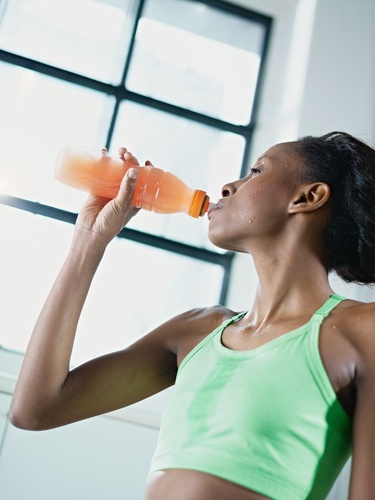Do you need sports drinks?
Having experienced such a hot and dry summer, I have been asked whether people really need to hydrate with sports drinks. If not, what is the best way to keep hydrated?
The typical sports drink is nothing more than a combination of water, sugar and electrolytes - mainly sodium and potassium. One of the most popular of them being Gatorade. In 8 fluid ounces, it provides 50 calories, 14 grams of sugar, 110 mg of sodium and 30 mg of potassium. There are other drinks that are increasing in popularity such as Vitamin Water or so called “nutrient-enhanced” drinks that have additional vitamins, minerals and/or supplements. In general, a typical 20 oz bottle provides 125 calories and well over 100% of the daily requirement for recommended vitamins and minerals.
Sports drinks can be beneficial for people doing continuous exercise for longer than 1 hour. The electrolytes in these drinks can help your body maintain fluid balance, keep your heart beating at a steady pace and your muscles moving. According to the American College of Sports Medicine, a person doing strenuous exercise needs to drink about 23 milliliters (about ¾ oz) of water or sport beverage per 1 pound of body weight at least 4 hours before the exercise. During the exercise, about 8 oz of fluid every 15 minutes is recommended. After exercise, about 16-24 oz of fluid for every 1 lb of body weight lost during the exercise.
That said, most exercises lasting less than 60 minutes will not cause severe depletion of carbohydrates and electrolytes, so it is better to hydrate with plain water. If you are not physically active, my recommendation is to avoid sport or vitamin enhanced drinks as they can contribute to weight gain and unnecessary supplementation of vitamins and minerals.
The nutrient-enhanced drinks claim to increase energy, focus, and to strengthen the immune system. It is true that vitamins and minerals are necessary to help metabolize the carbohydrates, protein and fat coming from the diet, but if you eat a balanced meal including lean protein, dairy, fruits and vegetables, whole grain, legumes and nuts, you don’t need additional vitamins unless you have been diagnosed with a vitamin deficiency.
So, how can you increase your fluid intake if you don’t like water? Try to:
- Add slices of lemon or lime into water
- Try carbonated waters if you like the fizziness
- Add a splash of 100% juice to a large container of water or carbonated water
- Try different teas, hot or cold
- It is ok to try diet drinks, but remember that they contain artificial sweeteners and other chemicals.
For more ideas on how to increase your fluid intake or to check if you are meeting your fluid needs, talk with a registered dietitian or go to the Academy of Nutrition website at www.eatright.org


